Unit 8 It must belong to Carla. 2d & Grammar Focus 课件+嵌入音频(共46张PPT)
文档属性
| 名称 | Unit 8 It must belong to Carla. 2d & Grammar Focus 课件+嵌入音频(共46张PPT) |
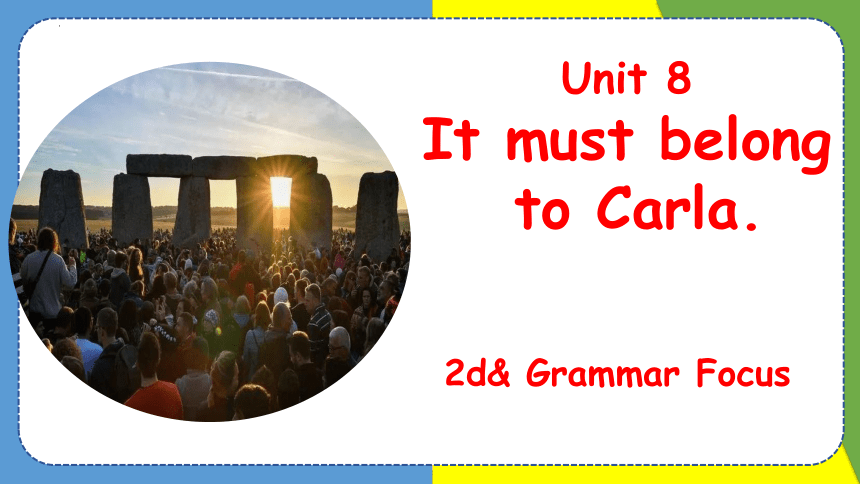
|
|
| 格式 | pptx | ||
| 文件大小 | 22.1MB | ||
| 资源类型 | 教案 | ||
| 版本资源 | 人教新目标(Go for it)版 | ||
| 科目 | 英语 | ||
| 更新时间 | 2023-10-24 00:00:00 | ||
图片预览

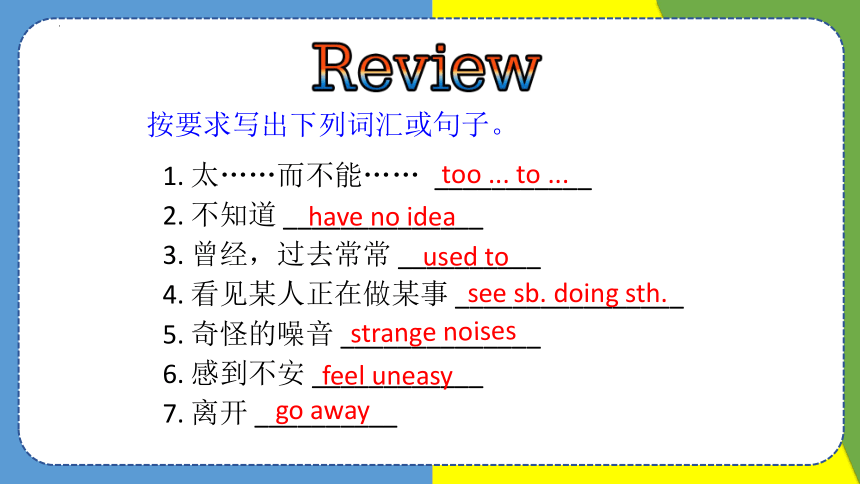
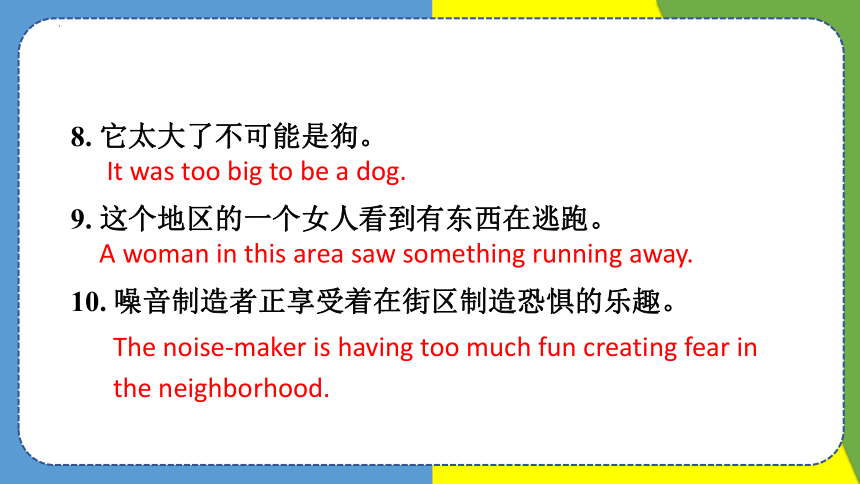
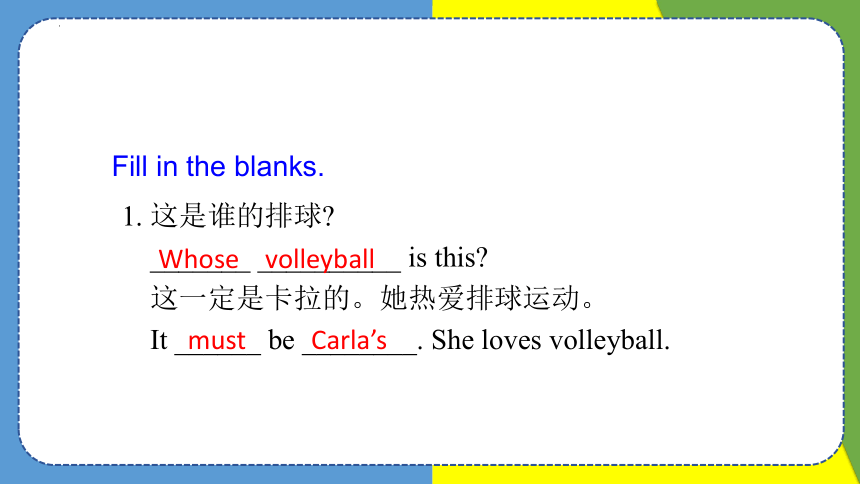
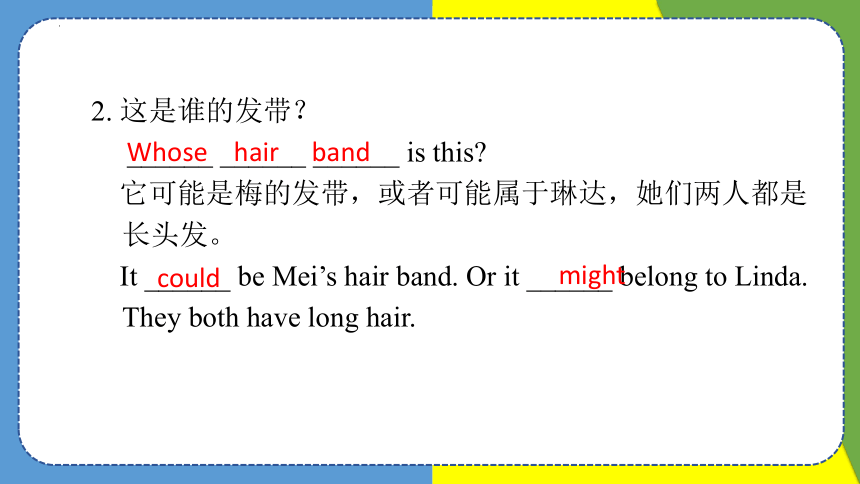
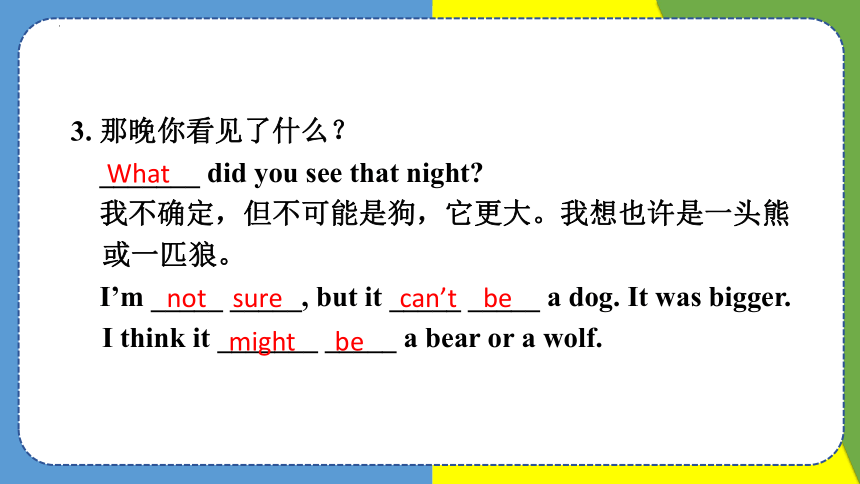
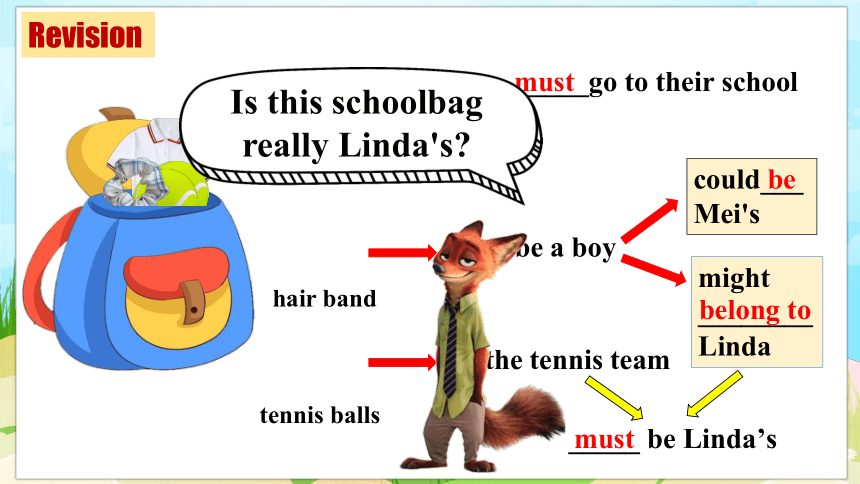
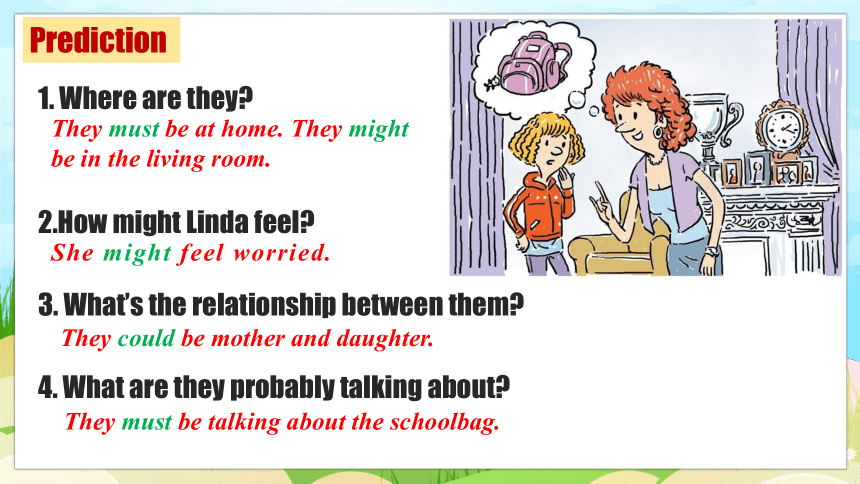
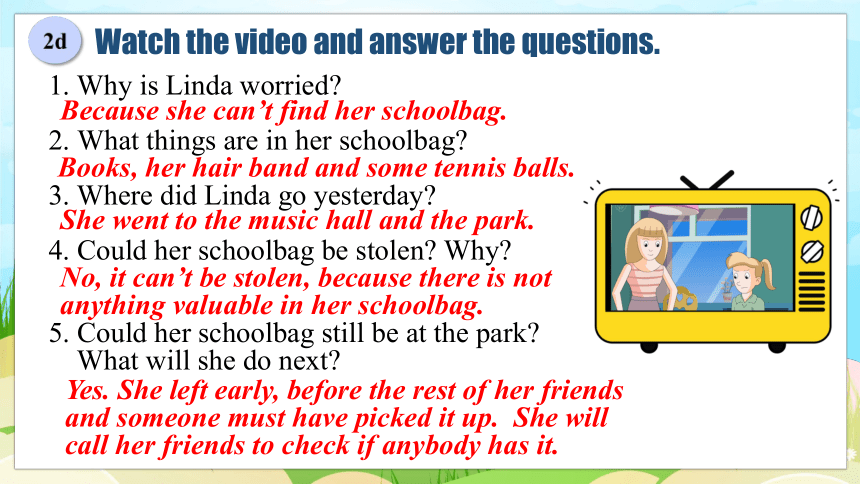
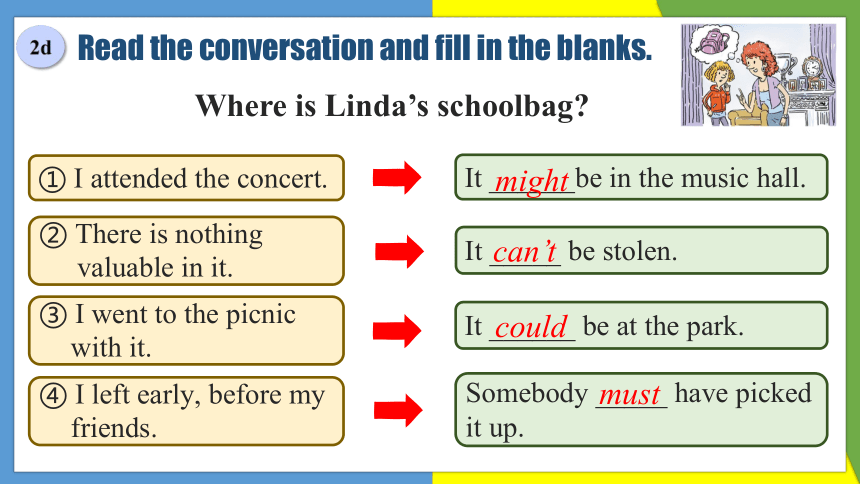
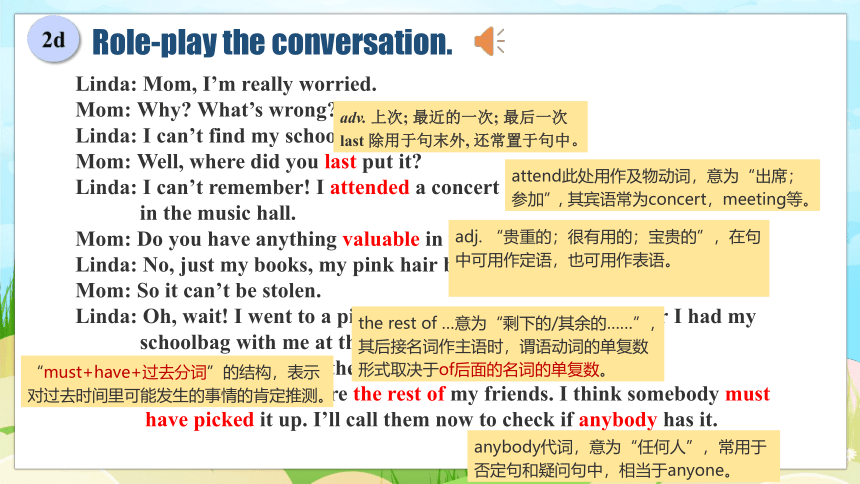
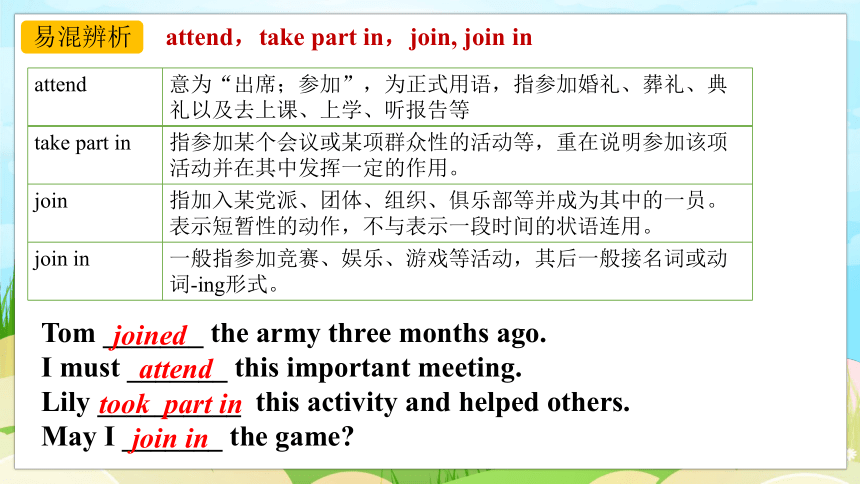
文档简介
(共46张PPT)
Unit 8
It must belong
to Carla.
2d& Grammar Focus
按要求写出下列词汇或句子。
1. 太……而不能…… ___________
2. 不知道 ______________
3. 曾经,过去常常 __________
4. 看见某人正在做某事 ________________
5. 奇怪的噪音 ______________
6. 感到不安 ____________
7. 离开 __________
too ... to ...
have no idea
used to
see sb. doing sth.
feel uneasy
strange noises
go away
8. 它太大了不可能是狗。
9. 这个地区的一个女人看到有东西在逃跑。
10. 噪音制造者正享受着在街区制造恐惧的乐趣。
It was too big to be a dog.
A woman in this area saw something running away.
The noise-maker is having too much fun creating fear in the neighborhood.
1. 这是谁的排球
_______ __________ is this
这一定是卡拉的。她热爱排球运动。
It ______ be ________. She loves volleyball.
Whose volleyball
must Carla’s
Fill in the blanks.
2. 这是谁的发带?
______ ______ ______ is this
它可能是梅的发带,或者可能属于琳达,她们两人都是长头发。
It ______ be Mei’s hair band. Or it ______ belong to Linda. They both have long hair.
could
might
Whose hair band
3. 那晚你看见了什么?
_______ did you see that night
我不确定,但不可能是狗,它更大。我想也许是一头熊或一匹狼。
I’m _____ _____, but it _____ _____ a dog. It was bigger. I think it _______ _____ a bear or a wolf.
What
not sure
can’t be
might be
school T-shirts
hair band
______go to their school
must
____ be a boy
could___ Mei's
might
________
Linda
can't
be
belong to
tennis balls
on the tennis team
_____ be Linda’s
must
Revision
Is this schoolbag really Linda's
1. Where are they
2.How might Linda feel
3. What’s the relationship between them
4. What are they probably talking about
They must be at home. They might be in the living room.
They could be mother and daughter.
They must be talking about the schoolbag.
She might feel worried.
Prediction
1. Why is Linda worried
2. What things are in her schoolbag
3. Where did Linda go yesterday
4. Could her schoolbag be stolen Why
5. Could her schoolbag still be at the park
What will she do next
Books, her hair band and some tennis balls.
She went to the music hall and the park.
Because she can’t find her schoolbag.
Watch the video and answer the questions.
No, it can’t be stolen, because there is not anything valuable in her schoolbag.
Yes. She left early, before the rest of her friends and someone must have picked it up. She will call her friends to check if anybody has it.
① I attended the concert.
It ______be in the music hall.
Where is Linda’s schoolbag
It _____ be stolen.
② There is nothing valuable in it.
It ______ be at the park.
③ I went to the picnic with it.
Somebody _____ have picked it up.
④ I left early, before my friends.
Read the conversation and fill in the blanks.
might
can’t
could
must
Role-play the conversation.
Linda: Mom, I’m really worried.
Mom: Why What’s wrong
Linda: I can’t find my schoolbag.
Mom: Well, where did you last put it
Linda: I can’t remember! I attended a concert yesterday so it might still be
in the music hall.
Mom: Do you have anything valuable in your schoolbag
Linda: No, just my books, my pink hair band and some tennis balls.
Mom: So it can’t be stolen.
Linda: Oh, wait! I went to a picnic after the concert. I remember I had my
schoolbag with me at the picnic.
Mom: So could it still be at the park
Linda: Yes. I left early, before the rest of my friends. I think somebody must
have picked it up. I’ll call them now to check if anybody has it.
adv. 上次; 最近的一次; 最后一次
last 除用于句末外, 还常置于句中。
attend此处用作及物动词,意为“出席;参加”, 其宾语常为concert,meeting等。
adj. “贵重的;很有用的;宝贵的”,在句中可用作定语,也可用作表语。
the rest of …意为“剩下的/其余的……”,其后接名词作主语时,谓语动词的单复数形式取决于of后面的名词的单复数。
“must+have+过去分词”的结构,表示对过去时间里可能发生的事情的肯定推测。
anybody代词,意为“任何人”,常用于否定句和疑问句中,相当于anyone。
attend 意为“出席;参加”,为正式用语,指参加婚礼、葬礼、典礼以及去上课、上学、听报告等
take part in 指参加某个会议或某项群众性的活动等,重在说明参加该项活动并在其中发挥一定的作用。
join 指加入某党派、团体、组织、俱乐部等并成为其中的一员。表示短暂性的动作,不与表示一段时间的状语连用。
join in 一般指参加竞赛、娱乐、游戏等活动,其后一般接名词或动词-ing形式。
易混辨析
attend,take part in,join, join in
Tom _______ the army three months ago.
I must _______ this important meeting.
Lily __________ this activity and helped others.
May I _______ the game
joined
attend
took part in
join in
① may/might/can/could have done sth. 推测过去时间里可能发生的事情。
He might/could have arrived there. 他可能早就到那里了。
② ought to/should have done sth. 本应该做某事,而事实上并没有做。否定句表示"不该做某事而做了"。ought to 在语气上比should 要强。
You ought to/should have been more careful in this experiment.
③ needn't have done sth. 本没必要做某事
You needn’t have dressed so warmly for the trip. The weather there was hot.
你本没必要为了旅行穿那么暖和,那里的天气很热。
④ would like to have done sth. 本打算做某事
I would like to have read the article, but I was very busy then.
我本打算读这篇文章,但我那时太忙了。
情态动词+have+过去分词
Close your book and try to retell the conversation.
Linda’s really ________. She can’t find her __________ . She ________________ yesterday so it ____________ in the music hall. There isn’t anything ________ in her schoolbag. So it _______stolen. Then she remembers that she ______________ after the concert and had her schoolbag with her __________. So it ____________ at the park. And she thinks somebody must have ___________. Linda will call them now to check if _________ has it.
attended a concert
might still be
can’t be
worried
schoolbag
valuable
went to a picnic
could still be
picked it up
at the picnic
anybody
Where did you last put it
attend a concert
It might be in the music hall.
nothing valuable
It can’t be stolen.
went to a picnic
It could be at the park.
left early, before the rest of friends.
Somebody must have picked it up.
last
Post-listening
2d
Retelling
情态动词 must, might, could, can’t 后接动词原形, 可以表示对现在的情况的 .
It can’t ( )…
It might/could ( ) …
It must ( ) …
+ be sb’s
It must /might/could
推测
be Tony’s(是…的)
belong to Tony.(属于…)
不可能
可能
一定
belong to sb.
Whose...is this
Post-listening
Summary
情态动词表示推测
情态动词must,can,could,may和might均可表示推测,可以对过去、现在或将来的情况作出语气强弱不同的推测。
1. must “一定;必定”,表示很大的可能性,只用于肯定句中。 e.g. The book is gone. He must take it to school.
【注意】mustn’t “禁止, 千万不要”,不表推测。
e.g. John, you mustn’t play football on the street.
We should keep quiet in the library. We mustn’t speak loudly.
3. may, might, could都能表示“可能”。could, might语气更委婉, might语气最为缓和,含义更不确定。
e.g. There could be life on some of the planets.
They may not know his address. I’m not sure about that.
She told me that she might go to Hawaii this winter.
2. can 常用于否定句或疑问句中表示惊异、怀疑、不相信等。
can’t 表示“不大可能”。
e.g. What can he mean
The door is locked. He can’t be at home.
对不同情况的推测
1. 情态动词+动词原形:对现在或将来的情况进行推测。
如:
You must be tired after your long walk.
Don’t play with the knife. You could cut yourself.
Our team might win the basketball match.
2. 情态动词+ be + 动词-ing形式:对此时此刻正在进行的情况进行推测。如:
There’s a lot of noise from next door. They must be having a party.
Mr. Li is not in his apartment. He might be working at his office.
3. 情态动词+ have + 过去分词:对过去的情况进行推测。如:
I couldn’t have left my bag on the bus.
They must have got lost or they’d be here by now.
Tom didn’t leave till three o’clock. He may/might have missed the train.
情态动词表示推测的用法
(3)“there+情态动词+be+主语+动词 -ing 形式”表示“可能/或
许/一定……做……”。
e.g. It is noisy; there might be some dogs barking.
太吵了,可能是有些狗在叫。
must 在表示肯定推测时,意为“一定”,但是用于否定句时,mustn’t 却表示“不能;禁止”,而不是“不一定”。
注意
—Finally, they came back.
—They ______ be hungry after such a long walk.
A.can’t B.must C.needn’t D.need
B
典例
点拨
可用语境分析法和语法判断法解答本题。can’t 表示否定的推测“不可能”;must 表示肯定的推测“一定”;need 用作情态动词时常用于否定句,needn’t“没必要” 。根据语境可知选B项。
情态动词表示推测的用法
When you are travelling, bring a map because it ______ help you.
A.can’t B.mustn’t C.used to D. may
D
典例
点拨
可用语境分析法解答本题。句意:当你旅行的时候,带一幅地图,因为它可能会帮助你。can’t “不可能”;mustn’t “不准,不许”; used to “过去常常”;may “可能”,表示推测。由语境可知选D项。
情态动词表示推测的用法
He ______ in the library now. I met him in the classroom just now.
A.can’t read B.can’t be reading
C.might be reading D.might read
B
典例
点拨
可用语境分析法和语法判断法解答本题。由空格所在句子的时间状语 now 可知, 用“情态动词+be+动词 -ing 形式”表示对正在发生的事情进行推测。由下一句可知表示否定推测,故选B。
情态动词表示推测的用法
1. —Whose physics book is this
—It ______ be Helen's because her name is on it.
A. mustn't B. must C. might D. can't
(2022 四川遂宁)
2. —David, do you know Su Yiming, a snowboarder from China
—Sure. He won the first place in the men’s Big Air Event. He _______ be hard-working.
A. needn’t B. can’t C. should D. must
(2022 四川泸州)
B
D
3. —Who is playing the piano in the music room Is it Mary
—No, it ______ be her. She has ______ to Beijing on business.
A. couldn’t; been B. can’t; gone
C. can’t; been D. mustn’t; gone
(2022 四川达州)
4. —Whose English book is this
—It ______ be Lily’s, but I’m not sure.
A. might B. can’t C. must
(2022 湖南怀化)
B
A
5. The book ______ be Mary’s. We can see her name on it.
A. need B. must C. can’t D. needn’t
(2022 天津)
6. —The paper cutting is pretty lively; who made it
—It ______ be Amy. None of us except her is able to do it.
A. would B. need C. must D. can
(2022 辽宁本溪、辽阳、葫芦岛)
B
C
7. —What will the weather be like tomorrow
—It ______ be rainy, cloudy or sunny. I am not sure.
A. must B. may C. can’t D. should
(2021 辽宁朝阳)
B
8. Life _______ be easy or difficult, sometimes it depends on how you look at it.
A. can't B. must C. can
(2021 四川成都)
C
9. —I saw Mr. Li in his office just now.
—No,it _______be him. He has _______ Guangzhou and will be back in two days.
A. mustn’t; gone to B. mustn’t; been to
C. can’t; been to D. can’t; gone to
(2021 新疆)
10. —Sandy, is Mr. Li in the teachers’ office now
—I am not sure. He ______ be there.
A. must B. can’t C. mustn’t D. may
(2021 江苏宿迁)
D
D
Choose the best way to complete each sentence using the words in brackets.
1. A: Where’s Jean
B: I’m not sure. She __________ (is/might be/must be) in the laboratory.
might be
n. 实验室
2. A: Everyone is going to the pool after school.
B: Really It ________ (must be / can’t be /could be ) hot outdoors.
must be
表示“位移”的动词用现在进行时态表将来。如:go去, come来, leave离开, arrive到达, return 回来, fly飞。
adv. 在户外,在野外
e.g. I am coming. = I will come.
He is leaving for Paris. = He will leave for Paris.
3. A: That’s the phone.
B: Hmm. I wonder who it __________ (must be / could be / should be).
could be
4. A: I wonder if these are Jim’s glasses.
B: They _________ (can’t be / might be / could be) his. He doesn’t wear glasses.
can’t be
5. A: I hear water running in the bathroom.
B: It ________________ (could be / must be / can’t be) Carla. She was thinking of taking a shower.
could be / must be
1. A: Many people are wearing coats.
B: The weather must be ________________________.
2. A: Sally has been coughing a lot.
B: She might be ______________________.
getting colder/cold outside
having a sore throat/ill
Complete these responses.
n. 外套
3. A: This restaurant is always very crowded.
B: The food ________________.
4. A: Whenever I try to read this book, I feel sleepy.
B: It can’t ______________.
must be delicious
be that boring
adj. 困的
Whenever I try to read this book, I feel sleepy.
sleep, sleepy, asleep
sleepy adj. 困的;想睡的。可作定语和表语。
asleep adj. 睡着的。强调状态,常作表语。
fall asleep 入睡;睡着
sleep v. 睡觉 n. 睡眠;睡觉
【语境应用】根据句意, 用sleep, sleepy或asleep填空。
1) Look at that ________ dog.
2) Tom is _____________________. Please keep quiet.
3) I think people need eight hours of ________ a day.
4) Grandpa fell ________ when he was watching TV.
asleep
sleepy
sleep
sleeping / asleep / sleepy
Look at this picture of a room. How much can you tell about the person who lives here Is it a boy or a girl What are his/her hobbies Discuss your ideas with a partner.
It could be a girl’s room because it’s very tidy.
I guess so. But it might be a boy’s room because the clothes look like boys’ clothes.
It could/might/can’t be... because ...
I guess so/I don’t think so.
But it might/could/must be ...
because …
Ⅰ. 将下列句子进行匹配。
1. Mr. and Mrs. Olson speak German.
2. Our teacher isn't here today.
3. Canada is smaller than Singapore.
4. My classmate Jim looks wet.
5. Steven is smiling today.
a. It can't be that small.
b. They must be from Germany.
c. He might be happy about his holiday.
d. She could be sick today.
e. It may be raining.
Ⅱ. 根据语境,选择恰当的情态动词填空。
1. She _______(must/might) get here on time, but I'm not sure.
2. Adam _______(must/can't) be in Shanghai, because he has gone to Hangzhou.
3. Oh, dear! You have walked so long on such a hot day! You _______(could/must) be tired.
4. —I've taken someone else's green gloves by mistake.
—It _______(could/can't) be Harry's. He always wears green.
5. Don't play with the knife! You _______(must/may) hurt yourself.
might
can't
must
could
may
Ⅲ. 阅读下面短文,用情态动词填空(答案可能不止一个),使短文完整、通顺。
Kate and Betty are in the same class and live in the same community. They often play together after school. Both of them are kind and helpful.
One Saturday afternoon, Kate and Betty were playing in their community when they noticed a wallet under a stone bench ( 长凳). They walked over and picked it up.
“Whose wallet (1)_____________________ this be ” asked Kate.
can/may/might/could
“It (2)_______________ be Mr. Brown's, but I'm not so sure,” answered Betty. “You know he enjoys sitting here from time to time.”
“It (3)_______ be his, because he has gone to London for a holiday. I think it (4)______________________ be Mr. White's, because he has formed the habit of sitting here to relax in the morning every day since he retired (退休).”
The two girls took the wallet and walked towards Mr. White's house. They rang the doorbell and Mr. White opened the door.
may/might/could
can't
must/may/might/could
“Hello, Mr. White! Is this wallet yours ” they asked.
“Oh, no. My wallet is here,” replied Mr. White.
“Whose wallet do you think this (5)____________________ be ”
“Let me see. Hmm ... I think it (6)__________________ be Mr. Black's or Mr. Jackson's. Oh, no. It (7)_______ be theirs because they have been away to visit their friends for three days.
can/may/might/could
may/might/could
can't
Oh, I remember now that Mr. Green has been looking for his wallet all morning. I noticed him sitting on the stone bench about half an hour ago. I think it (8)_______ be his.”
Mr. White made a phone call to Mr. Green right away. A few minutes later, Mr. Green arrived. He recognized (认出) his wallet as soon as he saw it. He thanked Kate and Betty again and again.
must
1. Review Grammar.
2. Finish Activity 4c.
3. Preview Section B 1a-1d.
Unit 8
It must belong
to Carla.
2d& Grammar Focus
按要求写出下列词汇或句子。
1. 太……而不能…… ___________
2. 不知道 ______________
3. 曾经,过去常常 __________
4. 看见某人正在做某事 ________________
5. 奇怪的噪音 ______________
6. 感到不安 ____________
7. 离开 __________
too ... to ...
have no idea
used to
see sb. doing sth.
feel uneasy
strange noises
go away
8. 它太大了不可能是狗。
9. 这个地区的一个女人看到有东西在逃跑。
10. 噪音制造者正享受着在街区制造恐惧的乐趣。
It was too big to be a dog.
A woman in this area saw something running away.
The noise-maker is having too much fun creating fear in the neighborhood.
1. 这是谁的排球
_______ __________ is this
这一定是卡拉的。她热爱排球运动。
It ______ be ________. She loves volleyball.
Whose volleyball
must Carla’s
Fill in the blanks.
2. 这是谁的发带?
______ ______ ______ is this
它可能是梅的发带,或者可能属于琳达,她们两人都是长头发。
It ______ be Mei’s hair band. Or it ______ belong to Linda. They both have long hair.
could
might
Whose hair band
3. 那晚你看见了什么?
_______ did you see that night
我不确定,但不可能是狗,它更大。我想也许是一头熊或一匹狼。
I’m _____ _____, but it _____ _____ a dog. It was bigger. I think it _______ _____ a bear or a wolf.
What
not sure
can’t be
might be
school T-shirts
hair band
______go to their school
must
____ be a boy
could___ Mei's
might
________
Linda
can't
be
belong to
tennis balls
on the tennis team
_____ be Linda’s
must
Revision
Is this schoolbag really Linda's
1. Where are they
2.How might Linda feel
3. What’s the relationship between them
4. What are they probably talking about
They must be at home. They might be in the living room.
They could be mother and daughter.
They must be talking about the schoolbag.
She might feel worried.
Prediction
1. Why is Linda worried
2. What things are in her schoolbag
3. Where did Linda go yesterday
4. Could her schoolbag be stolen Why
5. Could her schoolbag still be at the park
What will she do next
Books, her hair band and some tennis balls.
She went to the music hall and the park.
Because she can’t find her schoolbag.
Watch the video and answer the questions.
No, it can’t be stolen, because there is not anything valuable in her schoolbag.
Yes. She left early, before the rest of her friends and someone must have picked it up. She will call her friends to check if anybody has it.
① I attended the concert.
It ______be in the music hall.
Where is Linda’s schoolbag
It _____ be stolen.
② There is nothing valuable in it.
It ______ be at the park.
③ I went to the picnic with it.
Somebody _____ have picked it up.
④ I left early, before my friends.
Read the conversation and fill in the blanks.
might
can’t
could
must
Role-play the conversation.
Linda: Mom, I’m really worried.
Mom: Why What’s wrong
Linda: I can’t find my schoolbag.
Mom: Well, where did you last put it
Linda: I can’t remember! I attended a concert yesterday so it might still be
in the music hall.
Mom: Do you have anything valuable in your schoolbag
Linda: No, just my books, my pink hair band and some tennis balls.
Mom: So it can’t be stolen.
Linda: Oh, wait! I went to a picnic after the concert. I remember I had my
schoolbag with me at the picnic.
Mom: So could it still be at the park
Linda: Yes. I left early, before the rest of my friends. I think somebody must
have picked it up. I’ll call them now to check if anybody has it.
adv. 上次; 最近的一次; 最后一次
last 除用于句末外, 还常置于句中。
attend此处用作及物动词,意为“出席;参加”, 其宾语常为concert,meeting等。
adj. “贵重的;很有用的;宝贵的”,在句中可用作定语,也可用作表语。
the rest of …意为“剩下的/其余的……”,其后接名词作主语时,谓语动词的单复数形式取决于of后面的名词的单复数。
“must+have+过去分词”的结构,表示对过去时间里可能发生的事情的肯定推测。
anybody代词,意为“任何人”,常用于否定句和疑问句中,相当于anyone。
attend 意为“出席;参加”,为正式用语,指参加婚礼、葬礼、典礼以及去上课、上学、听报告等
take part in 指参加某个会议或某项群众性的活动等,重在说明参加该项活动并在其中发挥一定的作用。
join 指加入某党派、团体、组织、俱乐部等并成为其中的一员。表示短暂性的动作,不与表示一段时间的状语连用。
join in 一般指参加竞赛、娱乐、游戏等活动,其后一般接名词或动词-ing形式。
易混辨析
attend,take part in,join, join in
Tom _______ the army three months ago.
I must _______ this important meeting.
Lily __________ this activity and helped others.
May I _______ the game
joined
attend
took part in
join in
① may/might/can/could have done sth. 推测过去时间里可能发生的事情。
He might/could have arrived there. 他可能早就到那里了。
② ought to/should have done sth. 本应该做某事,而事实上并没有做。否定句表示"不该做某事而做了"。ought to 在语气上比should 要强。
You ought to/should have been more careful in this experiment.
③ needn't have done sth. 本没必要做某事
You needn’t have dressed so warmly for the trip. The weather there was hot.
你本没必要为了旅行穿那么暖和,那里的天气很热。
④ would like to have done sth. 本打算做某事
I would like to have read the article, but I was very busy then.
我本打算读这篇文章,但我那时太忙了。
情态动词+have+过去分词
Close your book and try to retell the conversation.
Linda’s really ________. She can’t find her __________ . She ________________ yesterday so it ____________ in the music hall. There isn’t anything ________ in her schoolbag. So it _______stolen. Then she remembers that she ______________ after the concert and had her schoolbag with her __________. So it ____________ at the park. And she thinks somebody must have ___________. Linda will call them now to check if _________ has it.
attended a concert
might still be
can’t be
worried
schoolbag
valuable
went to a picnic
could still be
picked it up
at the picnic
anybody
Where did you last put it
attend a concert
It might be in the music hall.
nothing valuable
It can’t be stolen.
went to a picnic
It could be at the park.
left early, before the rest of friends.
Somebody must have picked it up.
last
Post-listening
2d
Retelling
情态动词 must, might, could, can’t 后接动词原形, 可以表示对现在的情况的 .
It can’t ( )…
It might/could ( ) …
It must ( ) …
+ be sb’s
It must /might/could
推测
be Tony’s(是…的)
belong to Tony.(属于…)
不可能
可能
一定
belong to sb.
Whose...is this
Post-listening
Summary
情态动词表示推测
情态动词must,can,could,may和might均可表示推测,可以对过去、现在或将来的情况作出语气强弱不同的推测。
1. must “一定;必定”,表示很大的可能性,只用于肯定句中。 e.g. The book is gone. He must take it to school.
【注意】mustn’t “禁止, 千万不要”,不表推测。
e.g. John, you mustn’t play football on the street.
We should keep quiet in the library. We mustn’t speak loudly.
3. may, might, could都能表示“可能”。could, might语气更委婉, might语气最为缓和,含义更不确定。
e.g. There could be life on some of the planets.
They may not know his address. I’m not sure about that.
She told me that she might go to Hawaii this winter.
2. can 常用于否定句或疑问句中表示惊异、怀疑、不相信等。
can’t 表示“不大可能”。
e.g. What can he mean
The door is locked. He can’t be at home.
对不同情况的推测
1. 情态动词+动词原形:对现在或将来的情况进行推测。
如:
You must be tired after your long walk.
Don’t play with the knife. You could cut yourself.
Our team might win the basketball match.
2. 情态动词+ be + 动词-ing形式:对此时此刻正在进行的情况进行推测。如:
There’s a lot of noise from next door. They must be having a party.
Mr. Li is not in his apartment. He might be working at his office.
3. 情态动词+ have + 过去分词:对过去的情况进行推测。如:
I couldn’t have left my bag on the bus.
They must have got lost or they’d be here by now.
Tom didn’t leave till three o’clock. He may/might have missed the train.
情态动词表示推测的用法
(3)“there+情态动词+be+主语+动词 -ing 形式”表示“可能/或
许/一定……做……”。
e.g. It is noisy; there might be some dogs barking.
太吵了,可能是有些狗在叫。
must 在表示肯定推测时,意为“一定”,但是用于否定句时,mustn’t 却表示“不能;禁止”,而不是“不一定”。
注意
—Finally, they came back.
—They ______ be hungry after such a long walk.
A.can’t B.must C.needn’t D.need
B
典例
点拨
可用语境分析法和语法判断法解答本题。can’t 表示否定的推测“不可能”;must 表示肯定的推测“一定”;need 用作情态动词时常用于否定句,needn’t“没必要” 。根据语境可知选B项。
情态动词表示推测的用法
When you are travelling, bring a map because it ______ help you.
A.can’t B.mustn’t C.used to D. may
D
典例
点拨
可用语境分析法解答本题。句意:当你旅行的时候,带一幅地图,因为它可能会帮助你。can’t “不可能”;mustn’t “不准,不许”; used to “过去常常”;may “可能”,表示推测。由语境可知选D项。
情态动词表示推测的用法
He ______ in the library now. I met him in the classroom just now.
A.can’t read B.can’t be reading
C.might be reading D.might read
B
典例
点拨
可用语境分析法和语法判断法解答本题。由空格所在句子的时间状语 now 可知, 用“情态动词+be+动词 -ing 形式”表示对正在发生的事情进行推测。由下一句可知表示否定推测,故选B。
情态动词表示推测的用法
1. —Whose physics book is this
—It ______ be Helen's because her name is on it.
A. mustn't B. must C. might D. can't
(2022 四川遂宁)
2. —David, do you know Su Yiming, a snowboarder from China
—Sure. He won the first place in the men’s Big Air Event. He _______ be hard-working.
A. needn’t B. can’t C. should D. must
(2022 四川泸州)
B
D
3. —Who is playing the piano in the music room Is it Mary
—No, it ______ be her. She has ______ to Beijing on business.
A. couldn’t; been B. can’t; gone
C. can’t; been D. mustn’t; gone
(2022 四川达州)
4. —Whose English book is this
—It ______ be Lily’s, but I’m not sure.
A. might B. can’t C. must
(2022 湖南怀化)
B
A
5. The book ______ be Mary’s. We can see her name on it.
A. need B. must C. can’t D. needn’t
(2022 天津)
6. —The paper cutting is pretty lively; who made it
—It ______ be Amy. None of us except her is able to do it.
A. would B. need C. must D. can
(2022 辽宁本溪、辽阳、葫芦岛)
B
C
7. —What will the weather be like tomorrow
—It ______ be rainy, cloudy or sunny. I am not sure.
A. must B. may C. can’t D. should
(2021 辽宁朝阳)
B
8. Life _______ be easy or difficult, sometimes it depends on how you look at it.
A. can't B. must C. can
(2021 四川成都)
C
9. —I saw Mr. Li in his office just now.
—No,it _______be him. He has _______ Guangzhou and will be back in two days.
A. mustn’t; gone to B. mustn’t; been to
C. can’t; been to D. can’t; gone to
(2021 新疆)
10. —Sandy, is Mr. Li in the teachers’ office now
—I am not sure. He ______ be there.
A. must B. can’t C. mustn’t D. may
(2021 江苏宿迁)
D
D
Choose the best way to complete each sentence using the words in brackets.
1. A: Where’s Jean
B: I’m not sure. She __________ (is/might be/must be) in the laboratory.
might be
n. 实验室
2. A: Everyone is going to the pool after school.
B: Really It ________ (must be / can’t be /could be ) hot outdoors.
must be
表示“位移”的动词用现在进行时态表将来。如:go去, come来, leave离开, arrive到达, return 回来, fly飞。
adv. 在户外,在野外
e.g. I am coming. = I will come.
He is leaving for Paris. = He will leave for Paris.
3. A: That’s the phone.
B: Hmm. I wonder who it __________ (must be / could be / should be).
could be
4. A: I wonder if these are Jim’s glasses.
B: They _________ (can’t be / might be / could be) his. He doesn’t wear glasses.
can’t be
5. A: I hear water running in the bathroom.
B: It ________________ (could be / must be / can’t be) Carla. She was thinking of taking a shower.
could be / must be
1. A: Many people are wearing coats.
B: The weather must be ________________________.
2. A: Sally has been coughing a lot.
B: She might be ______________________.
getting colder/cold outside
having a sore throat/ill
Complete these responses.
n. 外套
3. A: This restaurant is always very crowded.
B: The food ________________.
4. A: Whenever I try to read this book, I feel sleepy.
B: It can’t ______________.
must be delicious
be that boring
adj. 困的
Whenever I try to read this book, I feel sleepy.
sleep, sleepy, asleep
sleepy adj. 困的;想睡的。可作定语和表语。
asleep adj. 睡着的。强调状态,常作表语。
fall asleep 入睡;睡着
sleep v. 睡觉 n. 睡眠;睡觉
【语境应用】根据句意, 用sleep, sleepy或asleep填空。
1) Look at that ________ dog.
2) Tom is _____________________. Please keep quiet.
3) I think people need eight hours of ________ a day.
4) Grandpa fell ________ when he was watching TV.
asleep
sleepy
sleep
sleeping / asleep / sleepy
Look at this picture of a room. How much can you tell about the person who lives here Is it a boy or a girl What are his/her hobbies Discuss your ideas with a partner.
It could be a girl’s room because it’s very tidy.
I guess so. But it might be a boy’s room because the clothes look like boys’ clothes.
It could/might/can’t be... because ...
I guess so/I don’t think so.
But it might/could/must be ...
because …
Ⅰ. 将下列句子进行匹配。
1. Mr. and Mrs. Olson speak German.
2. Our teacher isn't here today.
3. Canada is smaller than Singapore.
4. My classmate Jim looks wet.
5. Steven is smiling today.
a. It can't be that small.
b. They must be from Germany.
c. He might be happy about his holiday.
d. She could be sick today.
e. It may be raining.
Ⅱ. 根据语境,选择恰当的情态动词填空。
1. She _______(must/might) get here on time, but I'm not sure.
2. Adam _______(must/can't) be in Shanghai, because he has gone to Hangzhou.
3. Oh, dear! You have walked so long on such a hot day! You _______(could/must) be tired.
4. —I've taken someone else's green gloves by mistake.
—It _______(could/can't) be Harry's. He always wears green.
5. Don't play with the knife! You _______(must/may) hurt yourself.
might
can't
must
could
may
Ⅲ. 阅读下面短文,用情态动词填空(答案可能不止一个),使短文完整、通顺。
Kate and Betty are in the same class and live in the same community. They often play together after school. Both of them are kind and helpful.
One Saturday afternoon, Kate and Betty were playing in their community when they noticed a wallet under a stone bench ( 长凳). They walked over and picked it up.
“Whose wallet (1)_____________________ this be ” asked Kate.
can/may/might/could
“It (2)_______________ be Mr. Brown's, but I'm not so sure,” answered Betty. “You know he enjoys sitting here from time to time.”
“It (3)_______ be his, because he has gone to London for a holiday. I think it (4)______________________ be Mr. White's, because he has formed the habit of sitting here to relax in the morning every day since he retired (退休).”
The two girls took the wallet and walked towards Mr. White's house. They rang the doorbell and Mr. White opened the door.
may/might/could
can't
must/may/might/could
“Hello, Mr. White! Is this wallet yours ” they asked.
“Oh, no. My wallet is here,” replied Mr. White.
“Whose wallet do you think this (5)____________________ be ”
“Let me see. Hmm ... I think it (6)__________________ be Mr. Black's or Mr. Jackson's. Oh, no. It (7)_______ be theirs because they have been away to visit their friends for three days.
can/may/might/could
may/might/could
can't
Oh, I remember now that Mr. Green has been looking for his wallet all morning. I noticed him sitting on the stone bench about half an hour ago. I think it (8)_______ be his.”
Mr. White made a phone call to Mr. Green right away. A few minutes later, Mr. Green arrived. He recognized (认出) his wallet as soon as he saw it. He thanked Kate and Betty again and again.
must
1. Review Grammar.
2. Finish Activity 4c.
3. Preview Section B 1a-1d.
同课章节目录
- Unit 1 How can we become good learners.
- Section A
- Section B
- Unit 2 I think that mooncakes are delicious!
- Section A
- Section B
- Unit 3 Could you please tell me where the restroom
- Section A
- Section B
- Unit 4 I used to be afraid of the dark.
- Section A
- Section B
- Unit 5 What are the shirts made of?
- Section A
- Section B
- Review of Units 1-5
- Unit 6 When was it invented?
- Section A
- Section B
- Unit 7 Teenagers should be allowed to choose their
- Section A
- Section B
- Unit 8 It must belong to Carla.
- Section A
- Section B
- Unit 9 I like music that I can dance to.
- Section A
- Section B
- Unit 10 You're supposed to shake hands.
- Section A
- Section B
- Review of Units 6-10
- Unit 11 Sad movies make me cry.
- Section A
- Section B
- Unit 12 Life is full of the unexpected
- Section A
- Section B
- Unit 13 We're trying to save the earth!
- Section A
- Section B
- Unit 14 I remember meeting all of you in Grade 7.
- Section A
- Section B
- Review of Units 11-14
